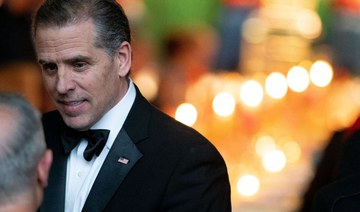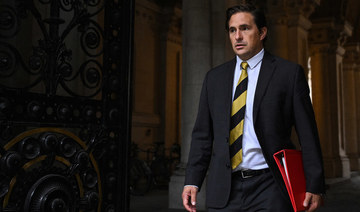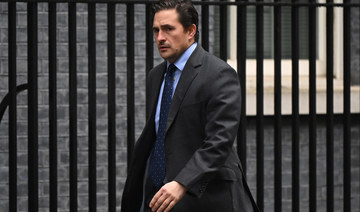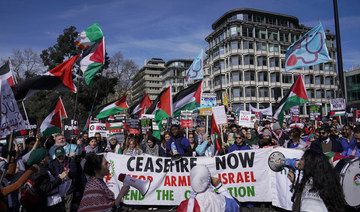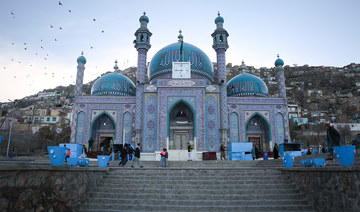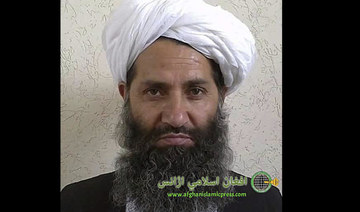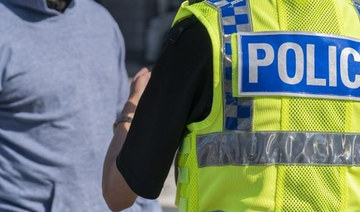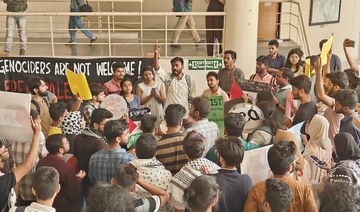WASHINGTON: The House on Wednesday authorized the impeachment inquiry into President Joe Biden, with every Republican rallying behind the politically charged process despite lingering concerns among some in the party that the investigation has yet to produce evidence of misconduct by the president.
The 221-212 party-line vote put the entire House Republican conference on record in support of an impeachment process that can lead to the ultimate penalty for a president: punishment for what the Constitution describes as “high crimes and misdemeanors,” which can lead to removal from office if convicted in a Senate trial.
Biden, in a rare statement about the impeachment effort, questioned the priorities of House Republicans in pursuing an inquiry against him and his family.
“Instead of doing anything to help make Americans’ lives better, they are focused on attacking me with lies,” the president said following the vote. “Instead of doing their job on the urgent work that needs to be done, they are choosing to waste time on this baseless political stunt that even Republicans in Congress admit is not supported by facts.”
Authorizing the monthslong inquiry ensures that the impeachment investigation extends well into 2024, when Biden will be running for reelection and seems likely to be squaring off against former President Donald Trump — who was twice impeached during his time in the White House. Trump has pushed his GOP allies in Congress to move swiftly on impeaching Biden, part of his broader calls for vengeance and retribution against his political enemies.
The decision to hold a vote came as Speaker Mike Johnson and his team faced growing pressure to show progress in what has become a nearly yearlong probe centered around the business dealings of Biden’s family members. While their investigation has raised ethical questions, no evidence has emerged that Biden acted corruptly or accepted bribes in his current role or previous office as vice president.
“We do not take this responsibility lightly and will not prejudge the investigation’s outcome,” Speaker Mike Johnson and his leadership team said in a joint statement after the vote. “But the evidentiary record is impossible to ignore.”
House Democrats stood in united opposition to the inquiry resolution Wednesday, calling it a farce perpetrated by those across the aisle to avenge the two impeachments against Trump.
“This whole thing is an extreme political stunt. It has no credibility, no legitimacy, and no integrity. It is a sideshow,” Rep. Jim McGovern, D-Mass., said during a floor debate.
Some House Republicans, particularly those hailing from politically divided districts, had been hesitant in recent weeks to take any vote on Biden’s impeachment, fearing a significant political cost. But GOP leaders have made the case in recent weeks that the resolution is only a step in the process, not a decision to impeach Biden. That message seems to have won over skeptics.
“As we have said numerous times before, voting in favor of an impeachment inquiry does not equal impeachment,” Rep. Tom Emmer, a member of the GOP leadership team, said at a news conference Tuesday.
Emmer said Republicans “will continue to follow the facts wherever they lead, and if they uncover evidence of treason, bribery or other high crimes and misdemeanors, then and only then will the next steps toward impeachment proceedings be considered.”
Most of the Republicans reluctant to back the impeachment push have also been swayed by leadership’s recent argument that authorizing the inquiry will give them better legal standing as the White House has questioned the legal and constitutional basis for their requests for information.
A letter last month from a top White House attorney to Republican committee leaders portrayed the GOP investigation as overzealous and illegitimate because the chamber had not yet authorized a formal impeachment inquiry by a vote of the full House. Richard Sauber, special counsel to the president, also wrote that when Trump faced the prospect of impeachment by a Democratic-led House in 2019, Johnson had said at the time that any inquiry without a House vote would be a “sham.”
Rep. Dusty Johnson, R-S.D., said this week that while there was no evidence to impeach the president, “that’s also not what the vote this week would be about.”
“We have had enough political impeachments in this country,” he said. “I don’t like the stonewalling the administration has done, but listen, if we don’t have the receipts, that should constrain what the House does long-term.”
Rep. Don Bacon, R-Nebraska, who has long been opposed to moving forward with impeachment, said that the White House questioning the legitimacy of the inquiry without a formal vote helped gain his support. “I can defend an inquiry right now,” he told reporters this week. “Let’s see what they find out.”
House Democrats remained unified in their opposition to the impeachment process, saying it is a farce used by the GOP to take attention away from Trump and his legal woes.
“You don’t initiate an impeachment process unless there’s real evidence of impeachable offenses,” said Rep. Jerry Nadler, the ranking Democrat on the House Judiciary Committee, who oversaw the two impeachments into Trump. “There is none here. None.”
Democrats and the White House have repeatedly defended the president and his administration’s cooperation with the investigation thus far, saying it has already made a massive trove of documents available.
Congressional investigators have obtained nearly 40,000 pages of subpoenaed bank records and dozens of hours of testimony from key witnesses, including several high-ranking Justice Department officials currently tasked with investigating the president’s son, Hunter Biden.
While Republicans say their inquiry is ultimately focused on the president himself, they have taken particular interest in Hunter Biden and his overseas business dealings, from which they accuse the president of personally benefiting. Republicans have also focused a large part of their investigation on whistleblower allegations of interference in the long-running Justice Department investigation into the younger Biden’s taxes and his gun use.
Hunter Biden is currently facing criminal charges in two states from the special counsel investigation. He’s charged with firearm counts in Delaware, alleging he broke laws against drug users having guns in 2018, a period when he has acknowledged struggling with addiction. Special counsel David Weiss filed additional charges last week, alleging he failed to pay about $1.4 million in taxes over a three-year period.
Democrats have conceded that while the president’s son is not perfect, he is a private citizen who is already being held accountable by the justice system.
“I mean, there’s a lot of evidence that Hunter Biden did a lot of improper things. He’s been indicted, he’ll stand trial,” Nadler said. “There’s no evidence whatsoever that the president did anything improper.”
Hunter Biden arrived for a rare public statement outside the US Capitol on Wednesday, saying he would not be appearing for his scheduled private deposition that morning. The president’s son defended himself against years of GOP attacks and said his father has had no financial involvement in his business affairs.
His attorney has offered for Biden to testify publicly, citing concerns about Republicans manipulating any private testimony.
“Republicans do not want an open process where Americans can see their tactics, expose their baseless inquiry, or hear what I have to say,” Biden said outside the Capitol. “What are they afraid of? I am here.”
GOP lawmakers said that since Hunter Biden did not appear, they will begin contempt of Congress proceedings against him. “He just got into more trouble today,” Rep. James Comer, the House Oversight Committee chairman, told reporters Wednesday.
House approves impeachment inquiry into President Biden as Republicans rally behind investigation
https://arab.news/wy69p
House approves impeachment inquiry into President Biden as Republicans rally behind investigation
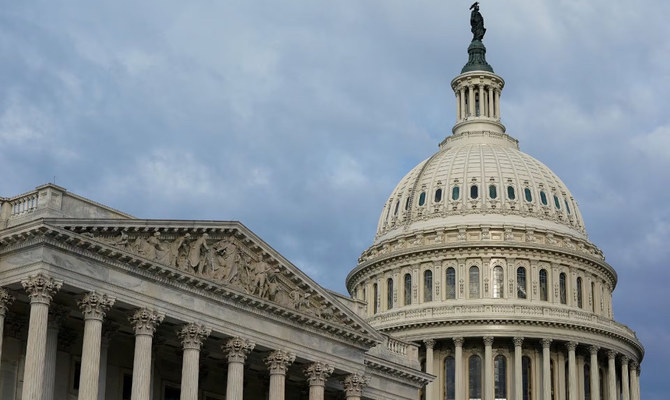
- GOP allies in Congress to move swiftly on impeaching Biden, part of his broader calls for vengeance and retribution against his political enemies
UK Veteran’s Minister Mercer to risk jail over Afghanistan inquiry
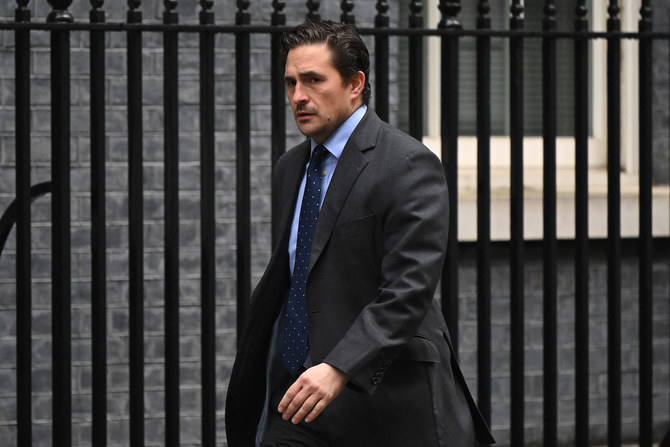
- Friends suggest minister will refuse to hand over identities of whistleblowers over fears for their well-being
- Mercer faces potential 52-week jail term, which would cost him his role as a minister and MP
LONDON: UK Veteran’s Minister Johnny Mercer will risk prison by not revealing the identities of whistleblowers to an inquiry investigating the killings of innocent people in Afghanistan.
The Times reported that friends of the MP had suggested he would rather be a “man of integrity” over the matter ahead of a deadline to hand the names to the inquiry, chaired by Lord Justice Haddon-Cave, next week.
Mercer has already given evidence to the inquiry, which is investigating allegations of extrajudicial killings and cover-ups by UK Special Forces between 2010 and 2013.
Appearing in February, he said a Special Forces soldier told him that in 2017 he was asked to carry a weapon to plant on an unarmed civilian to make them seem like an enemy combatant. He refused to reveal the source and others out of fear for their safety, with suggestions that some may be suffering from post-traumatic stress disorder and could be mentally vulnerable.
Haddon-Cave gave Mercer until April 5 to reveal the names, which was later extended. Failure to comply, he was warned, could result in a year-long prison term, which would cost him his job as a minister and his position as an MP. He could also face a fine.
One friend of the MP told The Times: “The inquiry doesn’t seem to realise that nothing will destroy their authority more than putting the veterans’ minister in the dock — the one man the military community trusts.
“If they do this, no one from the military community will want to co-operate with the inquiry. They seem to think Mercer will fold under the pressure and they will get their way. But he won’t. He will go down as a man of integrity and the inquiry will lose all support.”
Former Armed Forces Minister James Heappey said Mercer should reveal the identities of his sources.
“I admire Johnny enormously for the way that he has done politics under his own rules with an incredible sense of mission … He is a remarkable man but on this particular point I think for him, for his family and actually for the credibility of the inquiry I think he does need to disclose these names,” Heappey said.
On Friday, the inquiry will examine the Ministry of Defence’s failure to provide evidence to it on time. It is still waiting to hear from senior officials, including former Defence Secretary Ben Wallace.
It has also heard allegations that Gen. Gwen Jenkins, future national security advisor and former Special Boat Service head, locked away a report into claims of extrajudicial killings instead of passing it to military police.
Mercer also suggested during the inquiry, which began in December 2022, that the next head of the UK Army Lt. Gen. Sir Roly Walker had given “unbelievable” testimony over claims that Special Air Service personnel had killed unarmed Afghans.
An investigation by The Times, meanwhile, has suggested that former members of specialist Afghan Army units CF 333 and ATF 444 could provide crucial witness testimony to the inquiry but that their subsequent relocation from Afghanistan was overseen by MoD officials in a potential conflict of interest.
Many had their asylum claims to come to the UK rejected, a decision now under review.
Arrests made at protests against UK arms sales to Israel
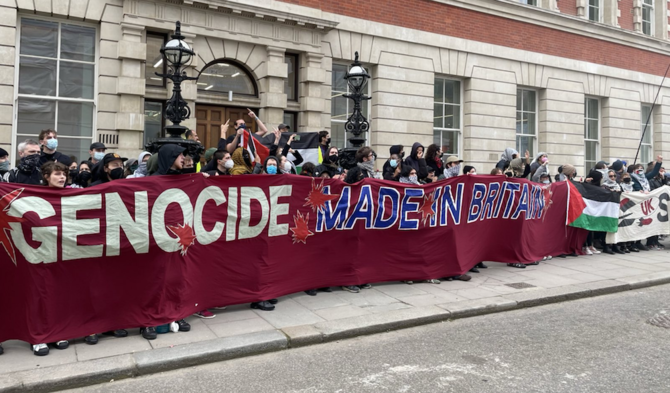
- Police in London, Glasgow called to deal with demonstrations
- ‘Protesters must stay within the law,’ Metropolitan Police says
LONDON: Police in London said they made three arrests at demonstrations held on Wednesday to protest against the sale of UK arms to Israel.
Protesters gathered outside the offices of the Department for Business and Trade in central London and more than 1,000 workers and trade unionists held protests at sites linked to BAE Systems across the UK.
“We are policing a protest in Admiralty Place and Horse Guards Parade,” the Metropolitan Police said in a statement.
“Officers have made three arrests after protesters blocked access to a building. Protesters must stay within the law.”
Police Scotland also confirmed its officers were called to a site in Glasgow to deal with protesters on Wednesday.
Members of Workers for a Free Palestine said the group was “escalating its tactics” by targeting BAE Systems cities and the British government department on the same day, the Independent reported.
“Our movement forced the issue of an arms embargo onto the table and polling shows the majority of the British public want to see arms sales to Israel banned, yet the government and also the Labour Party continue to ignore the will of the people,” a WFP protester named Tania, who took to the streets in London, told the newspaper.
“The government has sought to play down the scale of its arms supplies to Israel but the reality is UK arms and military support play a vital role in the Israeli war machine and evidence that three British aid workers were killed by a drone partly produced in the UK shows the extent of British complicity in Israel’s genocide,” she said.
Another protester, named Jamie, who was demonstrating in Glasgow, said: “Our fundamental aim is for the UK government to introduce an arms embargo. It’s the morally right thing to do.
“It’s vital that action is taken. It’s been almost seven months of death and destruction in Palestine and the idea that that is being committed by weapons that are being produced in our neighborhoods is horrifying.
“Our long-term goal is an arms embargo from the government but our short-term aim here today is to just disrupt business as usual for BAE, to disrupt the manufacture, to cost them time, cost them money and slow down the trade of weapons to Israel.”
BAE Systems said it respected people’s “right to protest peacefully” and that its arms exports complied with regulations.
“The ongoing violence in the Middle East is having a devastating impact on civilians in the region and we hope the parties involved find a way to end the violence as soon as possible,” it said.
“We operate under the tightest regulation and comply fully with all applicable defense export controls, which are subject to ongoing assessment.”
US defends talking to Taliban in Afghanistan
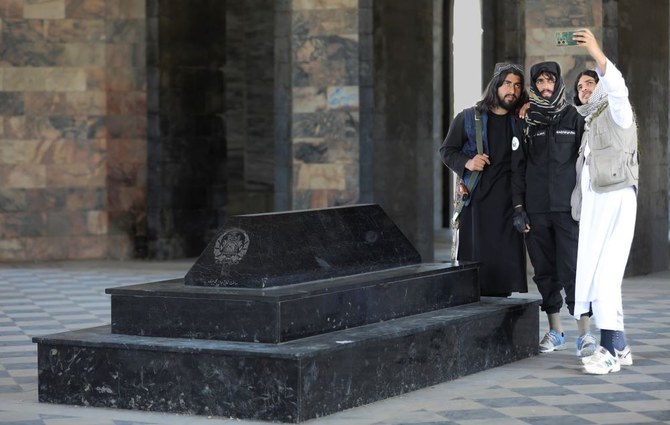
- Dialogue works in US interests, supports Afghan people, State Department says
- Taliban took power in 2021 following withdrawal of US-led coalition
LONDON: The US State Department has defended talking to the Taliban in order to serve Washington’s interests in Afghanistan and the wider region.
The department’s principal deputy spokesperson, Vedant Patel, told reporters that talking with the group not only worked in US interests but supported “the Afghan people.”
The Taliban took control of Afghanistan in 2021 following the withdrawal of US-led coalition forces and the collapse of the Western-backed Afghan government.
They have drawn significant hostility on the international stage for their repression of people, especially their treatment of women and girls, limits on education and reintroduction of violent punishment.
Some fear engaging with the Taliban could lend them legitimacy, but Patel said dialogue between the group and the US “allows us to speak directly with the Taliban, and it’s an opportunity for us to continue to press for the immediate and unconditional release of US nationals in Afghanistan, including those who we have determined to be wrongfully detained.”
“We’ll also use those opportunities to directly talk about the Taliban’s commitments to counterterrorism and of course, as always, human rights is also on the agenda,” he said.
British police officer pleads guilty to terror charges for showing support for Hamas
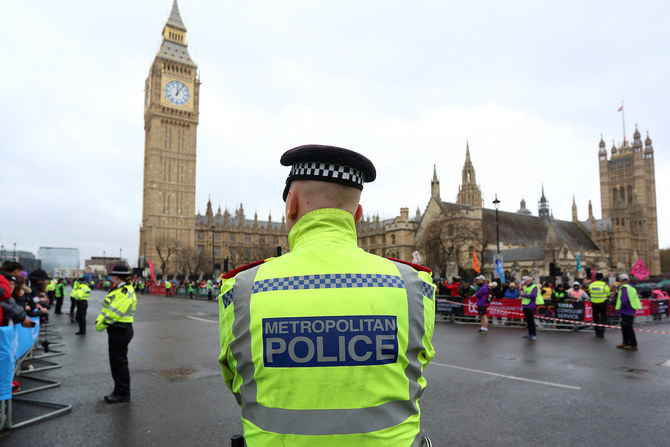
- Adil pleaded guilty in Westminster Magistrates’ Court to two counts of publishing an image in support of a proscribed organization in violation of the Terrorism Act
- Two other police officers who were concerned by the images reported Adil to superiors
LONDON: A British police officer pleaded guilty Thursday to terror charges for showing support on social media for Hamas, which is designated a terror group and banned in the UK.
West Yorkshire constable Mohammed Adil admitted sharing two images on WhatsApp supporting the group three weeks after Hamas and other Palestinian militants stormed into Israel on Oct. 7 and killed about 1,200 people and seized some 250 hostages.
Adil, 26, pleaded guilty in Westminster Magistrates’ Court to two counts of publishing an image in support of a proscribed organization in violation of the Terrorism Act.
In messages shared on WhatsApp stories with nearly 1,100 contacts, Adil posted images of a fighter wearing a Hamas headband, prosecutor Bridget Fitzpatrick said.
“Today is the time for the Palestinian people to rise, set their paths straight and establish an independent Palestinian state,” an Oct. 31 post said, apparently quoting the leader of Hamas’ military wing.
A second post on Nov. 4 was said to quote a Hamas military spokesperson.
Two other police officers who were concerned by the images reported Adil to superiors, Fitzpatrick said. He was arrested in November and has been suspended from the force.
“I accept that at the time of the offending you were of good character,” Chief magistrate Paul Goldspring told Adil, though he said he may impose a prison term when he is sentenced June 4.
Adil was released on bail.
California police move in to dismantle pro-Palestinian protest camp at UCLA

- The pre-dawn police crackdown at UCLA marked the latest flashpoint for mounting tensions on US college campuses
- Live TV footage showed about six protesters under arrest
LOS ANGELES: Hundreds of helmeted police muscled their way into a central plaza of the University of California at Los Angeles early on Thursday to dismantle a pro-Palestinian protest camp attacked the previous night by pro-Israel supporters.
The pre-dawn police crackdown at UCLA marked the latest flashpoint for mounting tensions on US college campuses, where protests over Israel’s conduct of the war in Gaza have led to student clashes with each other and law enforcement.
Live TV footage showed about six protesters under arrest, kneeling on the ground, their hands bound behind their backs with zip-ties.
Dozens of loud explosions were heard during the clash from flash-bang charges, or stun grenades, fired by police.
Demonstrators, some carrying makeshift shields and umbrellas, sought to block the officers’ advance by their sheer numbers, while shouting, “push them back” and flashing bright lights in the eyes of the police. Others on the opposite side of the camp gave up quickly, and were seen walking away with their hands over their heads under police escort.
Around sunset on Wednesday, officers in tactical gear had begun filing onto the UCLA campus and taking up positions adjacent to a complex of tents occupied by throngs of demonstrators, live footage from the scene showed.
Local television station KABC-TV estimated 300 to 500 protesters were hunkered down inside the camp, while around 2,000 more had gathered outside the barricades in support.
But the assembled police stood by on the periphery for hours before finally starting to force their way into the encampment around 3:15 a.m. PDT (1015 GMT), tearing down barricades and arresting occupants who refused to leave. The raid was led by a phalanx of California Highway Patrol officers carrying shields and batons.
Some of the protesters had been seen donning hard hats, goggles and respirator masks in anticipation of the siege a day after the university declared the encampment unlawful.
Prior to moving in, police urged demonstrators in repeated loudspeaker announcements to clear the protest zone, which occupied a plaza about the size of a football field between the landmark twin-tower auditorium Royce Hall and the main undergraduate library.
An initial group of Los Angeles police officers who briefly entered a corner of the camp were overwhelmed by demonstrators and forced to retreat, before reinforcements arrived by the busload about an hour later.
Violent clash precedes crackdown
UCLA had canceled classes for the day on Wednesday following a violent clash between the encampment’s occupants and a group of masked counter-demonstrators who mounted a surprise assault late Tuesday night on the tent city.
The occupants of the outdoor protest camp, set up last week, had remained mostly peaceful before the melee, in which both sides traded blows and doused each other with pepper spray.
Members of the pro-Palestinian group said fireworks were thrown at them and they were beaten with bats and sticks. University officials blamed the disturbance on “instigators” and vowed an investigation.
The confrontation went on for two or three hours into early Wednesday morning before police restored order. A spokesperson for California Governor Gavin Newsom later criticized the “limited and delayed campus law enforcement response” to the unrest as “unacceptable.”
As the much-expanded police force entered the campus on Wednesday night to clear the encampment, some of the protesters were heard yelling at them, “Where were you yesterday?“
Taylor Gee, a 30-year old pro-Palestinian protester and UCLA law student, said the police action felt “especially galling” to many protesters given the slow police response a night earlier.
“For them to come out the next night to remove us from the encampment, it doesn’t make any sense, but it also makes all the sense in the world.”
Protests at schools across the US
UCLA officials said the campus, which enrolls nearly 52,000 students, including undergraduates and graduate scholars, would remain shuttered except for limited operations on Thursday and Friday.
The protests follow the Oct. 7 attack on southern Israel by Hamas militants from the Gaza Strip and the ensuing Israeli offensive on the Palestinian enclave.
Students have rallied or set up tent encampments at dozens of schools across the US in recent days, calling for an immediate ceasefire in Gaza and demanding schools divest from companies that support Israel’s government. Many of the schools have called in police to quell the protests.
The demonstrations across the country have been met with counter-protesters accusing them of fomenting anti-Jewish hatred. The pro-Palestinian side, including Jews opposed to Israeli actions in Gaza, say they are being unfairly branded as antisemitic for criticizing Israel’s government and expressing support for human rights.
The issue has taken on political overtones in the run-up to the US presidential election in November, with Republicans accusing some university administrators of turning a blind eye to antisemitic rhetoric and harassment.
Wednesday night’s police action came a day after police in New York City arrested pro-Palestinian activists who occupied a building at Columbia University and removed a tent city from the campus of the Ivy League school.
Police arrested a total of about 300 people at Columbia and City College of New York, Mayor Eric Adams said. Many of those arrested were charged with trespassing and criminal mischief.
The clashes at UCLA and in New York were part of the biggest outpouring of US student activism since the anti-racism rallies and marches of 2020.
Ninety pro-Palestinian demonstrators — students and outsiders — were arrested at Dartmouth University in New Hampshire on Wednesday, the Hanover Police Department said. They were charged with criminal trespass and resisting arrest.



